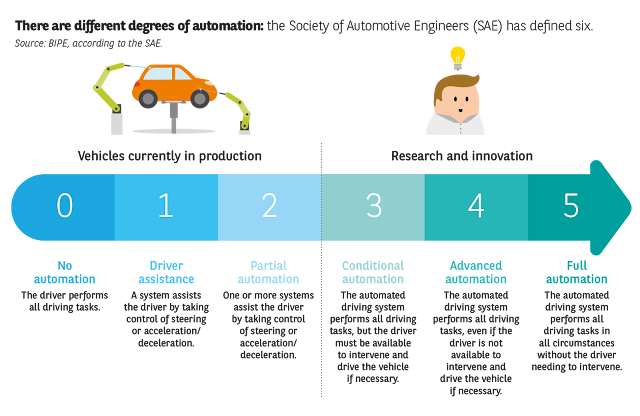5 – Law
Beyond the benefits of a hightech society, every machines created to be more efficient
apparently help human do less work. As the hightech era continuingly advance broader into
transportation, it calls the name of “Autonomous vehicle” or “Driverless vehicle”. Technically, by
its name, the car drives itself and the passengers without a driver’s manipulation which brings
controversies between people who want ultimate convenience and ones care about their
survivals. Especially, legislators will be facing a much more complicated puzzle not only traffic
issue, but also economy, environment, etc. There are hardly any governments that have done a
particular research or released regulatory framework to sort out the vehicle technology. The U.S
department of transportation specifically issued 15 point Federal policy of automated vehicles
regarding the expectations for manufacturers deploying and developing these vehicles. Each
year, the number of states considering legislation related to autonomous vehicles has gradually
increased up to 33 states. However, on the ethical category, autonomous vehicle still receive
suspicion from most consumers. For example, if the driver is not driving, who will take the
responsibility for car accident. Is it still necessary to take blood alcohol concentration for
possible drunk driver? All of the existing standard for traffic would be outdated. Products liability
also raises a huge conflict among consumers, insurance providers, complainants and
manufacturers.
Citations
https://www.insurancejournal.com/research/app/uploads/2016/09/U.S.AutonomousVehiclepoli
cyguidancePDF.pdf
https://www.brookings.edu/research/productsliabilityanddriverlesscarsissuesandguidingpri
nciplesforlegislation/
http://www.ncsl.org/research/transportation/autonomousvehiclesselfdrivingvehiclesenactedl
egislation.aspx
http://www.nortonrosefulbright.com/knowledge/publications/141954/autonomousvehiclesthele
gallandscapeintheus
apparently help human do less work. As the hightech era continuingly advance broader into
transportation, it calls the name of “Autonomous vehicle” or “Driverless vehicle”. Technically, by
its name, the car drives itself and the passengers without a driver’s manipulation which brings
controversies between people who want ultimate convenience and ones care about their
survivals. Especially, legislators will be facing a much more complicated puzzle not only traffic
issue, but also economy, environment, etc. There are hardly any governments that have done a
particular research or released regulatory framework to sort out the vehicle technology. The U.S
department of transportation specifically issued 15 point Federal policy of automated vehicles
regarding the expectations for manufacturers deploying and developing these vehicles. Each
year, the number of states considering legislation related to autonomous vehicles has gradually
increased up to 33 states. However, on the ethical category, autonomous vehicle still receive
suspicion from most consumers. For example, if the driver is not driving, who will take the
responsibility for car accident. Is it still necessary to take blood alcohol concentration for
possible drunk driver? All of the existing standard for traffic would be outdated. Products liability
also raises a huge conflict among consumers, insurance providers, complainants and
manufacturers.
Citations
https://www.insurancejournal.com/research/app/uploads/2016/09/U.S.AutonomousVehiclepoli
cyguidancePDF.pdf
https://www.brookings.edu/research/productsliabilityanddriverlesscarsissuesandguidingpri
nciplesforlegislation/
http://www.ncsl.org/research/transportation/autonomousvehiclesselfdrivingvehiclesenactedl
egislation.aspx
http://www.nortonrosefulbright.com/knowledge/publications/141954/autonomousvehiclesthele
gallandscapeintheus



Comments
Post a Comment